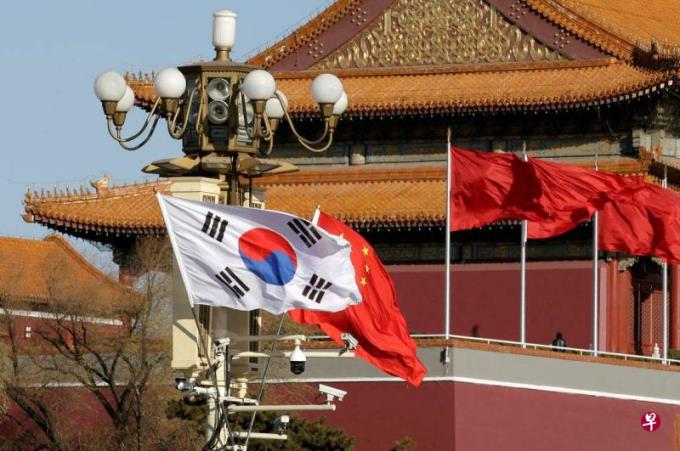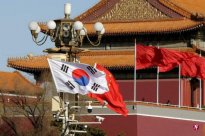
The sequelae of the Korean Yin Xiyue government overcome the Sade missile incident, and China, who tried to seek new relationships with the third system of Chinese President Xi Jinping, seemed to see a new relationship, and encountered another reef.Because the Chinese ambassador to Korea Xing Haiming expressed his dissatisfaction with South Korean foreign policy when he invited South Korea's representative of the South Korean party to express his dissatisfaction with South Korean foreign policy.For this reason, South Korea's Chao Ye has set off dissatisfaction with China, and relations between the two countries have once again faced a big deal.
The position also mentioned that in the contradictions between the United States and China, the countries that bet in China will regret it, and South Korea cannot understand the "Chinese Dream" of Chinese President Xi Jinping.In addition, the stance has once again emphasized the "double interruption" proposition of "stop North Korea's nuclear weapons and missile tests and interrupts the joint Korean and American military exercises" that North Korea has rejected, and criticized South Korea to mention the "peace and stability of the Taiwan Strait" to interfere with the Chinese internal affairs.the behavior of.In ignoring the Korean version of the Indo -Pacific Strategic Report published on December 29 last year, China describes China as the hard work and position of "the main cooperative object country", and the reasons for the continuous appearance of South Korea's trade deficit with China are blamed from China and so on.Pushing all responsibilities to the South Korean government's policies to the United States as if threatening South Korea must modify the diplomatic route.
The South Korean government was indignant to the Chinese Ambassador's words and deeds, saying that it was a direct interference in South Korean diplomatic lines and attempts to intervene in domestic politics of South Korea.The South Korean government believes that as a diplomatic ambassador, the Vienna Agreement should be "enhanced with friendly cooperation with the state in the country", but the above situation is not in line with the regulations."" ".However, the Chinese Ministry of Foreign Affairs stated that Ambassador Xing's speech was a normal behavior within the responsibility of diplomats. There was no mistake. Instead, he summoned the South Korean Ambassador to China in the form of a "schedule" and conveyed China's protest.The outbreak of the unsuitable "ambassador to meet the war" broke out.
Stainment or compress China Non -primary goals
This incident is not simple because it truthfully reflects the Chinese government's understanding of South Korea.
Each speech representing the Chinese ambassador to Korea will have a degree of difference, but it will never be personal opinions.In fact, the essence of the incident lies in China's concerns and dissatisfaction with the South Korean government's foreign policy.In particular, China showed an impatient attitude towards the Yin Xiyue government to strengthen the Korean -American alliance and improve the cooperation between the South Korean and American triangle cooperation in order to ensure the peace and stability of the Korean Peninsula.In other words, this is a signal that China, which has been watching the Korean government's foreign strategy in the past year, has turned to pressure after the movement of South Korea has failed to meet the expectations.It can be seen that China tries to put pressure on South Korea by further strengthening the diplomacy of war wolves and psychological warfare.
Especially, China strongly opposed the talks of the Washington Declaration of the North Korean Nuclear Corporation (NCG) in April this April of this Korean and American summit and "NCG) and" maintaining peace and stability of the Taiwan Strait ".In addition, in November last year, South Korea and America shared an agreement to share the North Korean missile alert intelligence in Phnom Penh, and promised to expand cooperation with the opportunity of the May Seventh National Group (G7) summit in May this year, making China more concerned about China.Coupled with the American Pacific Economic Framework (IPEF) dominated by the United States, on May 27th, a considering China Supply Network Agreement Committee was established. South Korea has also become a very important member of the United Nations Security Council, and China is even more anxious.
South Korea, aimed at the goal of "global central country", is expected to expand in the role of the international community.Sexual effects will become meaningless.
However, China also needs to change its understanding of South Korea's position and status.
Yin Xiyue's government has always clarified that the pursuit of freedom, peace, and prosperity of the international community has been based on universal value and international norms.In addition, all countries are facing the two core strategic concerns of survival, that is, how to ensure national security and sustainable economic development goals.The South Korean government believes that at least in the field of security, the previous government's expectations of direct communication and the theory of Chinese role in the previous government failed to achieve results.In order to ensure safety, it is stated that it is necessary to strengthen the Korean and American alliances and emphasize the cooperation between South Korea and the United States and Japan.However, China believes that this is the strategy of pressure on China to China and thinks that South Korea is taking the lead.From the perspective of South Korea's position, it is not the primary goal of South Korea, but China has always regarded South Korea's policy as a subordinate variable in the South Korean and American Alliance.This is a unilateral and random judgment.
Unable to understand South Korea's North Korean Nuclear concerns
The same is true of the issue of "peace and stability of the Taiwan Strait".
In the 1992 China -Korea establishment of diplomatic relations, South Korea has agreed to the "one China" claim that it has not changed so far.This time, it just emphasizes the internationalism principles that oppose the status quo unilaterally changing the status quo.North Korea's use of nuclear weapons to threaten the stability and peace of the Korean Peninsula is a typical example of "changing the status quo through new forces", but China only emphasizes North Korea's concerns.
North Korea's nuclear issue is a problem of survival for South Korea. Of course, South Korea's primary goal is that North Korea has no denuclearization.In this case, China advocates removing sanctions and pressure on North Korea, and it is necessary to accept North Korea's requirements, which is obviously covering the essence of the North Korean nuclear issue.China cannot understand how much South Korea is worried about the marginalization of nuclearization, and the urgency of coexistence of North Korea, North Korea, North Korea, who has the ability to coexist with intercontinental missiles (ICBM) capabilities.
North Korea has shown no intention of abandoning nuclear, and continues to completely ignore the goodwill of the South Korean government.It seems that North Korea hopes not only to protect and lift sanctions.As a nuclear country, North Korea has consolidated the ambition to develop asymmetric North and South relations; in this way, China unilaterally requires South Korea to change the diplomatic route, which is a South Korean position that completely does not consider guarding peace as the primary goal.
China is necessary to understand that if the direction of the North Korean nuclear can develop to the management level, South Korea can also create a certain diplomatic space.Not long ago, U.S. Secretary of State Blint also emphasized that the international community is interested in encouraging North Korea's responsible actions, stopped missile provocation, and starting dialogue.The same reason.
Xi Jinping also emphasized mutual respect with Brinken, saying that "none of which can shape each other according to their own wishes". It is not appropriate to push all the responsibilities of South Korea -China relations to all the responsibilities to South Korea.EssenceIn order to get rid of the tilting trend, South Korea emphasizes adherence to each other to respect each other, and cannot apply dual standards according to different objects.If China's policy on South Korea will continue, South Korea's anti -China public opinion, which has deteriorated, will be improved, which will play a negative role in improving the relationship, and it may also lead to the situation that China does not want to see -South Korea is more inclined to the United States and the United States.South Korea, America, Japan Triangle cooperation.
Like China has always emphasized "China is not a former China", South Korea is certainly not former South Korea.When the two countries understand each other's obvious restrictions on each other, they may not solve the problem regardless of the unilateral requirements of the other party's position.It is hoped that the two countries can stand on a mutually beneficial stand, to find new equilibrium points through communication, and give full play to the wisdom of solving problems.It is hoped that as the United States and China make a attempt to reduce the danger of misunderstanding and misjudgment, it is also hoped that Hanzhong can build communication channels that do not avoid differences.



